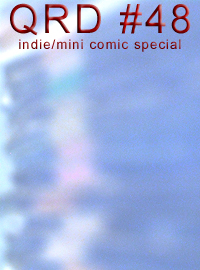
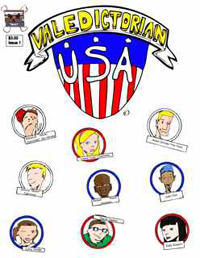
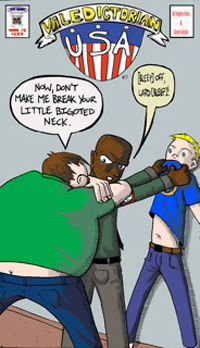
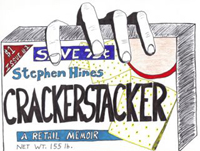
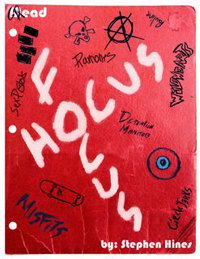






February 2011
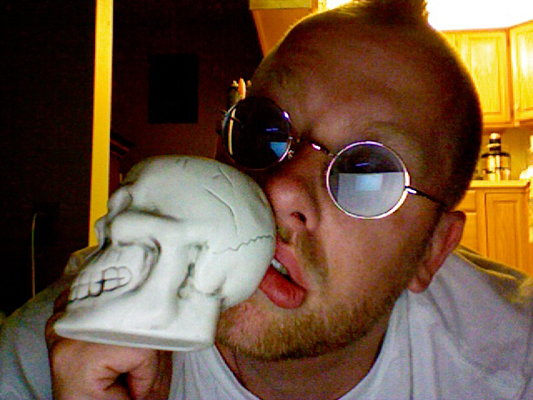
City: Troy, OH
Comics: Valedictorian USA, Crackerstacker
Websites: www.stephenhines.org
QRD – How old were you when you first got into comics & did you always stick with them or did you come back to them?
Stephen – I remember being something like five years old & going with my mom to the grocery store, seeing that magical spinning metal rack of comics & begging for one every time. There was a short time where I got away from comics for a while, then the first Star Wars movie came out & I was right back in the fold. From there I was steadily into comics until I graduated from high school in 1988. From that point, I focused on being a rock n’ roll musician exclusively & didn’t get back into comics again until shortly after I got married in 1991. From there I’ve never again wavered in my intense love affair with comics.
QRD – What was the first comic book you ever bought?
Stephen – I’m totally guessing here, but I’m pretty sure it was Spider-Man. Remember, I’m an old man so the memory’s a bit spotty. But Spidey taught me everything I needed to know about science & being a loser with the ladies. Unfortunately I’ve excelled more at the latter.
QRD – How old were you when you put out your first comic?
Stephen – Thirty-eight years old...ugh! Why did I wait so freakin’ long?!
QRD – What decade do you think produced the best comics?
Stephen – I’m not trying to sound politically correct or anything, but I think every decade has had its amazing stuff. As far as my all time favorites (so far), Sandman, V for Vendetta, & Watchmen probably kick-started the timeless stuff for me. But there’s nothing wrong with pure plot adventure stuff from time to time, too.
QRD – Why comics instead of just writing or drawing?
Stephen – Actually I do regular fiction as well... & I’m starting to dabble in nonfiction. I’ve self-published a young adult novel called Hocus Focus, which has sold very well (by my standards). I’m working on ghost writing a memoir for a friend who’s a retired state highway patrolman. Variety is the spice of life! My first comic series (Valedictorian USA) actually started out as a young adult novel written in teleplay format. When I finished it, the literary agent I had at the time thought it would work better as a graphic novel &, even though I didn’t stick with that agent, I was all over that idea like a cheap suit.
QRD – Do you see mini-comics & indie comics as paths to mainstream comics or as their own unique media?
Stephen – I’m not sure I see them as paths to mainstream comics, although I’ve heard of a few mini-comics, indies, & webcomics getting picked up by big companies. Would I love for my stuff to be picked up by a big company that actually has a marketing budget? Sure! Not because I’m greedy for cash, but for the fact that more people would get to see my work & (hopefully) enjoy it. But, honestly, I just fell in love with minis about three or four years ago when I first attended S.P.A.C.E.
QRD – How many copies of your comic do you print in your first run?
Stephen – This is going to sound weird, but I teach at a joint vocational high school that has a full arsenal of printing press options, so I usually only have them print 25-50. The small print runs, for me, make it easier for the teachers & students who are kind enough to squeeze me in; plus, the easy access I have to their services makes it possible to go back & beg for more copies if I have a great sales day at a con.
QRD – How much do you think comics should cost?
Stephen – That’s tough to say. If the full comic is in color, I realize that printing costs, as well as labor, have to be factored in. My only gripe is with the prices for many graphic novels. Does Dynamite really need to charge that much for the latest volume of The Boys?!
QRD – How many books do you produce a year & how many would you like to?
Stephen – I’ve only been able to put out one issue of Valedictorian USA per year & that’s because I’m paying the artist out of my own pocket. If I had my way, we’d have put out one issue a month for ten months... & the dang graphic novel would’ve been out for a year by now. But I’m just now starting to put out Crackerstacker (debuting at SPACE this year) so we’ll see how many of those I can put out in a year. I’m illustrating it & my art proceeds at a glacier-like pace.
QRD – Do you think stories should be serialized or delivered as complete works?
Stephen – There’s plenty of room for both. To me it would depend on the creative team’s resources (time & money, chiefly).
QRD – How are comic strips different than comic books & which medium do you prefer?
Stephen – Comic strips can be pumped out in a short time span... & they’re cheap to produce. I did a webcomic called Clyde the Redneck for a couple years & it was a fun, quick burst of creative energy. That being said, I prefer to do comic books. Apparently I have caviar tastes & a Spam budget!
QRD – How long is it from when you start a comic until it’s printed?
Stephen – It varies because the artist I mainly work with (the mighty Daniel Salcido) is working freelance. So, whenever he can fit me in between his other illustration work & his day job is cool by me. But usually he can produce an issue’s worth of art in 2-4 months.
QRD – What do you better with your comics now than when you first started?
Stephen – Wow! Excellent question! I guess I’d say the overall graphic design of the whole product, but I’m still not remotely happy with that aspect of my books. If I had a budget I’d hand those duties off to more capable hands in a New York minute!
QRD – At what point in the artistic process do you work digitally?
Stephen – I write almost exclusively on my laptop, other than scribbling down ideas when I can’t get to a computer. Also, I do some digital cleanup of art & all of the graphic design work on a computer.
QRD – What do you think of digital comics & webcomics?
Stephen – I think both are excellent ways for folks to get their work out there without cost (mostly). Personally, being an old geezer, I prefer to read my comics on paper. But I do love reading webcomics, as long as they’re short pieces.
QRD – Do you prefer working in color or black & white?
Stephen – I’d prefer color, but my finances only allow for color covers. But there are certain stories that just work better as black & white, so I could see always having a certain amount of colorless comic goodness in my future.
QRD – How many different people should work on a comic & what should their jobs be?
Stephen – For us indie folk, the fewer the better (writer + artist = good enough for me!). It cuts down on costs, headaches, etc. Plus, it’s a lot more intimate than working with a big bureaucratic chain in a media conglomerate. That kind of clutter dilutes the artists’ vision & leads to entirely too much compromise.
QRD – How do you find collaborators?
Stephen – Digitalwebbing.com helped me find Daniel Salcido. What a great resource! Now I’m starting to network more & find folks who, for some reason, want to collaborate with me. Also, I’ve been fortunate enough to have had a lot of students who are artistically gifted & I stay in touch. One former student is probably going to illustrate a graphic novel I’m writing about a group of middle-aged rockers who take one last stab at breaking it big time in the music industry. Another former student designed the covers for my series of books collecting song lyrics I’ve written (Unheard on This Earth).
QRD – How tight do you think a script should be as far as telling the artist what to draw?
Stephen – That depends on the artist I’m working with, how well I know/trust them, etc. I’d prefer that the work would be a collaboration where the artist has freedom to add his/her own touches of genius.
QRD – What comic book person would you be most flattered to be compared to?
Stephen – Alan Moore! Of course, that’ll never happen, but a pasty white guy can dream, right?
QRD – What do your friends & family think of your comics?
Stephen – Most of them seem to hold my young adult novel in higher esteem because they aren’t into comics at all. My wife digs my comics, though. She’s a comics nerdette.
QRD – What do you think of superheroes?
Stephen – Any more I can’t really get into them as much as when I was a kid. About the closest to capes & spandex I come would be The Boys by Garth Ennis. I tend to gravitate toward dark, gritty fiction.
QRD – Marvel or DC?
Stephen – In the past I would’ve said Marvel, but DC’s Vertigo line is amazing! Most of the time I read stuff by indie publishers, though.
QRD – What comic characters other than your own would you like to work with?
Stephen – I think I’ll leave that up to others. I wouldn’t want to be saddled with having to keep that character’s back catalog of plots straight to avoid continuity issues. Lazy? Me? NEVER!
QRD – Ideally would you self-publish?
Stephen – I’d honestly prefer not to. I suck at marketing & it’d be much more fun to just do the creative work & have other gifted folks take it from there.
QRD – What conventions do you try to attend & why?
Stephen – SPACE is my mainstay. It’s such a warm, friendly atmosphere full of gifted creative people who encourage & support each other. Other than that, I’m going to try some others that I haven’t tried before. It’s kind of a trial & error thing where creators have to feel out which cons are more indie friendly.
QRD – What do you do to promote your books?
Stephen – I use social networking sites, book trailers on YouTube, my website... but cons are the most effective tool by far.
QRD – Do you think your comics are well suited to comic shops or would sell better elsewhere?
Stephen – It depends on the shop. Stores are a lot like cons: some are indie-friendly & others only cater to capes & spandex type stuff.
QRD – What other medium would you like to see some of your comics made into (television, film, games, action figures, etc.)?
Stephen – I’d love to sell the film rights to Valedictorian USA. Hollywood? Hello? Are you listening?
QRD – Do you consider yourself a comic collector or a comic reader or both?
Stephen – I started out as a collector, but nowadays I’m just a rabid reader. The story & art are what’s important to me.
QRD – What do you see as the most viable mediums for comics distribution 10 years from now?
Stephen – With the rate our technology is growing it’s almost impossible to say. Maybe Ray Bradbury would be better suited to answer this question. Ha-ha!
QRD – What would you like to see more people doing with comics?
Stephen – As Alan Moore always says, pushing the boundaries of what the medium is capable of doing. Why not explore experimental ways of telling stories with text & art?
QRD – Anything else?
Stephen – Thank you so much for your efforts
to promote indie creators! You rock!







